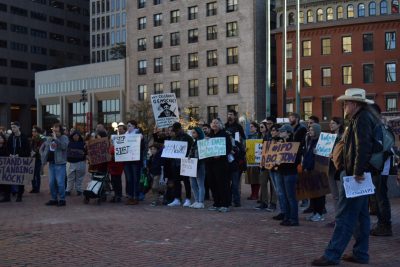
About 80 people gathered in front of City Hall Wednesday afternoon to encourage the City of Boston to change Columbus Day, the second Monday in October, to Indigenous Peoples Day.
Indigenous Peoples Day Massachusetts rally organizers consider the name change “a first step toward recognizing the genocide of millions of Indigenous people and the theft of their lands that began with the arrival of Columbus,” according to the organization’s website.
Cultural Survival, an organization dedicated to promoting the rights of indigenous people, according to Program Manager Danielle DeLuca, also got involved in organizing the gathering in Boston after successfully implementing the name change in Cambridge.
DeLuca explained at the rally that to many people, Columbus Day does not have positive connotations, which is why organizations like Indigenous Peoples Day Massachusetts and Cultural Survival are pushing to change the holiday.
“Columbus was not really a hero as a historical figure, but really the bringer of genocide … murder, and enslavement,” DeLuca said during the gathering.
Changing the name of the holiday could also help change the false perceptions of Columbus, DeLuca said at the rally.
“The movement is really to get the record straight — celebrate indigenous people that currently exist today in the U.S. and Boston and across the world, [and] just to recognize the true record of what happened,” DeLuca said.
Speakers at the event discussed the need for change, explaining the significance and hurt that the holiday currently brings to native people.
Mark Camp, the deputy executive director of Cultural Survival, acknowledged the importance of Boston’s global prominence when he spoke to the crowd.
“Boston has long seen itself as a global city and a global leader,” Camp said. “The people of Boston were important leaders in the abolition movement, and Boston continues to be a leader in education, healthcare and many other things.”
Camp went on to call upon the city to take action in regards to Columbus Day in order to maintain its reputation as a leader of social change.
“If Boston wants to continue to be seen as a global leader, it’s time to show that and abolish Columbus Day as a holiday,” Camp said.
Benya Kraus, a junior at Tufts University, also spoke to the crowd about the name change, citing the Indigenous People’s Day movement at her school and her belief that the same should happen throughout the whole city.
“We’re here in solidarity, and this has been a very long fight and a long time coming,” Kraus said.
Moonamum James, a co-leader of United American Indians of New England, another organization involved in promoting the name change in Boston, said it is important for people to be educated about the truth.
“Columbus wasn’t the hero that everyone makes him out to be,” he said. “That’s why we’re here though, just to try to educate.”
Several attendees at the gathering said they recognize the importance of having Columbus Day officially changed to Indigenous People’s Day.
Rovanna Neal, 24, of Dorchester, said this issue matters to her because she said she believes it is important to educate children.
“Changing this will better next generations by teaching them what happened before Columbus came, and not just what they’ve been reading in school,” Neal said.
Ken Sazama, 44, of Jamaica Plain, said the harm of the name is too great to leave it standing as the title of a national holiday.
“The name is antiquated. The name is racist. The name should be Indigenous People’s Day,” he said.
Parker Breza, 19, a sophomore at Tufts, said although something as simple as a name change may seem insignificant, it will make a substantial difference.
“A lot of people view a name change as just a symbolic gesture, but they forget that when history is continually erased, correcting those false narratives and bringing up these counter-narratives is really important,” Breza said.
Breza, whose father is Native American, also discussed the fact that because of the hurt Columbus caused to a large number of people, nationally celebrating him can be traumatic and detrimental.
“Columbus is obviously someone who did a lot of really bad things and literally committed genocide against an entire group of people,” he said. “To continue to honor that person is really traumatizing for Native American people.”























































































































patr89 • Oct 7, 2016 at 4:17 pm
There’s no such thing as “indigenous people”. Everybody came from somewhere else. At least that’s what the anthropologists tell us. This is just another effort to gain special dispensation under the guise of “diversity”.
TONIO MUA • Oct 6, 2016 at 11:40 am
The article fails to point out that there is already a Federal holiday honoring
native Americans, the 4th Friday of September.
Columbus Day honors Italian-Americans. A more appropriate action would be to
replace it with Italian-American day. They suffered persecution when they
immigrated, both for being Italian and being Catholic.
Why was no Italian-American interviewed for this article?
Does that make Naba Khan racist?
I don’t think so. But it is a significant oversight.